Your Weekly Mindful Scroll 📜
An exploration of distraction
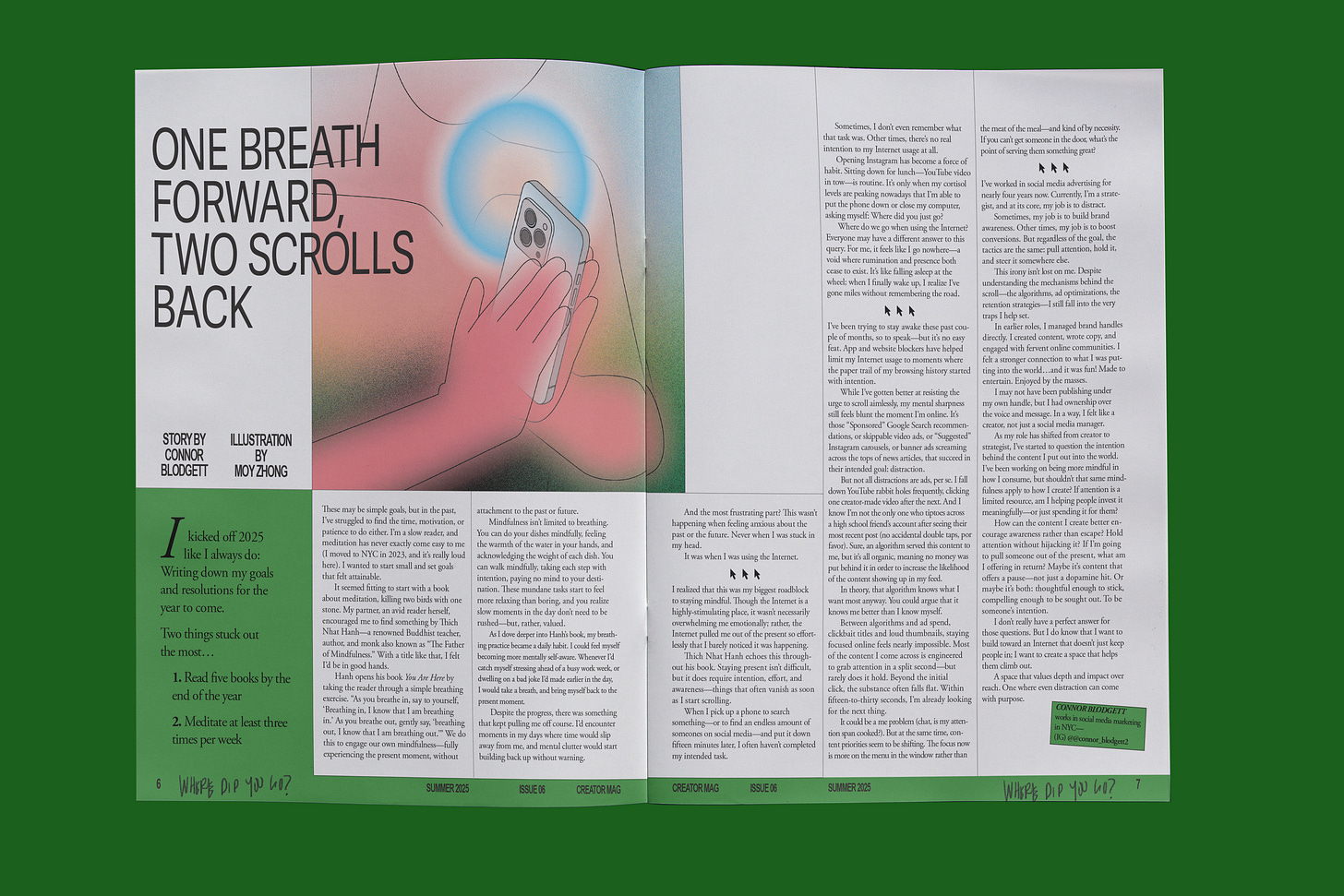
blog.eighty-seven // Tomorrow marks Day Fifteen of our inaugural, thirty-day Subathon.
And right now, the crown is ripe for the taking.
First, let’s backtrack. Every time you refer someone to our newsletter, you get one step closer to winning exclusive prizes, such as →
A Sticker Pack for 5 referrals 🌩️
A Framed Creator Mag Poster for 25 referrals 🖼️
A Comped Flight to the Block Party (yes, really) for 100 referrals ✈️*
These items will only be available during the Subathon. In other words: After the next thirty days, once they’re gone, they’re gone.
On top of that: Whoever refers the most people gets a full-page ad in our next print edition of Creator Mag, created in tandem with our team.**
I’ve said it before, but we’re truly building this thing alongside you. Every open, read, and share helps us do what we do, and your support truly means the world to us.
Below, you’ll find reader Connor Blodgett’s thoughtful essay from Issue Six: “WHERE DID YOU GO?” While Connor’s meditations on mindfulness shine throughout, we’d argue his words (and the piece’s twist) are even better when enjoyed in print. We only have three copies of Issue 6 left, so grab yours today!
And one last note: While we host regular gatherings at our studio in Chicago—including this upcoming Wednesday—mark your calendars for October 15. Our next Block Party is heading westward 🏖️
— NGL
P.S. Last blog, we wrote our first negative review. You can read it here.
Sponsored by Fourthwall
Life After Patreon With Ben & Emil 🎙️
Back in 2023, podcasters Ben Cahn and Emil DeRosa launched The Ben & Emil Show, delivering comedic takes on politics and the economy every week.
A year in, however, they made a pivotal decision: move their membership community from Patreon to Fourthwall.
Why? They wanted to build a customized, all-in-one website that put their fans first.
These days, Ben and Emil use Fourthwall to manage memberships, share bonus video content, and drop new apparel products—all from the same place.
The results: A month after switching, the podcasters had secured 5,000 paid members…and haven’t slowed down since.
Want to learn more about how Ben and Emil pulled it off? Read their full playbook here.
One Breath Forward, Two Scrolls Back
By Connor Blodgett
I kicked off 2025 like I always do: Writing down my goals and resolutions for the year to come.
Two things stuck out the most…
Read five books by the end of the year
Meditate at least three times per week
These may be simple goals, but in the past, I’ve struggled to find the time, motivation, or patience to do either. I’m a slow reader, and meditation has never exactly come easy to me; I moved to NYC in 2023, and it’s really loud here. I wanted to start small and set goals that felt attainable.
It seemed fitting to start with a book about meditation, killing two birds with one stone. My partner, an avid reader herself, encouraged me to find something by Thich Nhat Hanh—a renowned Buddhist teacher, author, and monk also known as “The Father of Mindfulness.” With a title like that, I felt I’d be in good hands.
Hanh opens his book You Are Here by taking the reader through a simple breathing exercise. “As you breathe in, say to yourself, ‘Breathing in, I know that I am breathing in.’ As you breathe out, gently say, ‘breathing out, I know that I am breathing out.’” We do this to engage our own mindfulness—fully experiencing the present moment, without attachment to the past or future.
Mindfulness isn’t limited to breathing. You can do your dishes mindfully, feeling the warmth of the water in your hands, and acknowledging the weight of each dish. You can walk mindfully, taking each step with intention, paying no mind to your destination. These mundane tasks start to feel more relaxing than boring, and you realize slow moments in the day don’t need to be rushed—but, rather, valued.
As I dove deeper into Hanh’s book, my breathing practice became a daily habit. I could feel myself becoming more mentally self-aware. Whenever I’d catch myself stressing ahead of a busy work week, or dwelling on a bad joke I’d made earlier in the day, I would take a breath, and bring myself back to the present moment.
Despite the progress, there was something that kept pulling me off course. I’d encounter moments in my days where time would slip away from me, and mental clutter would start building back up without warning.
And the most frustrating part? This wasn’t happening when feeling anxious about the past or the future. Never when I was stuck in my head.
It was when I was using the Internet.
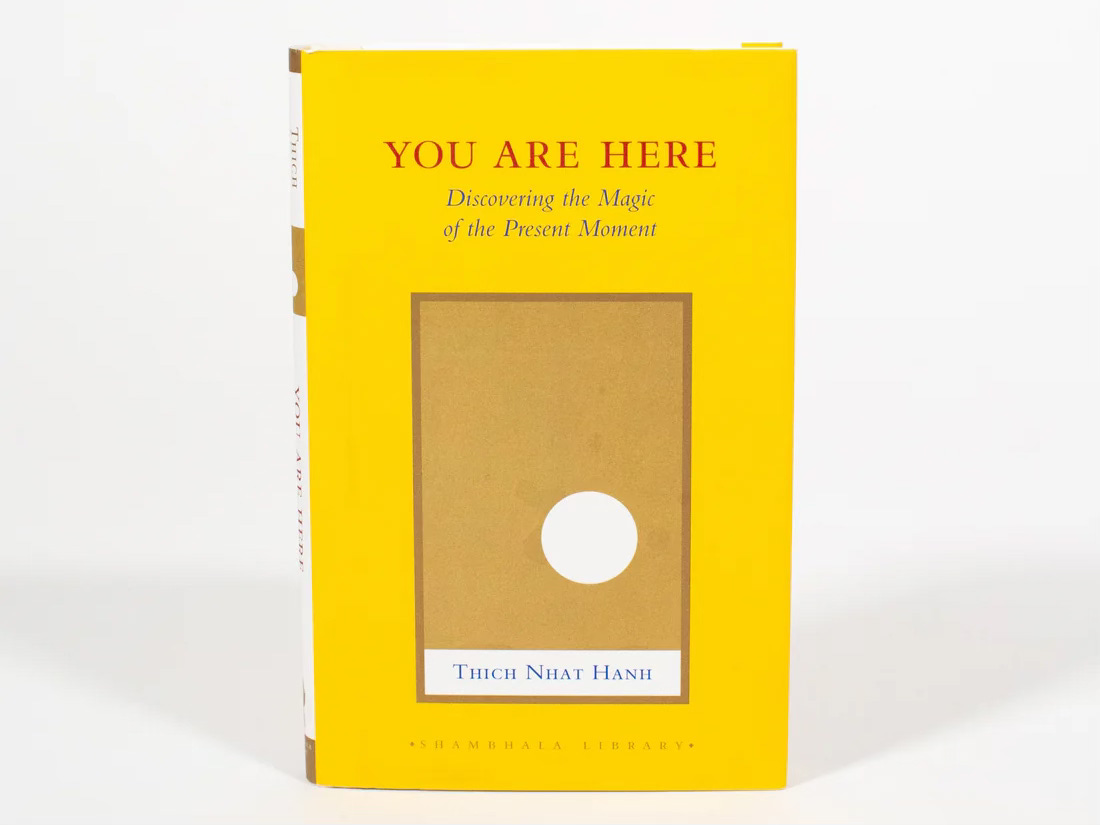
I began to realize that this was my biggest roadblock to staying mindful. The Internet is a highly-stimulating place, but it wasn’t necessarily overwhelming me emotionally; rather, it was pulling me out of the present so effortlessly that I barely noticed it was happening.
Thich Nhat Hanh echoes this throughout his book. Staying present isn’t difficult, but it does require intention, effort, and awareness—things that often vanish as soon as I start scrolling.
When I pick up a phone to search something—or to find an endless amount of someones on social media—and put it down fifteen minutes later, I often haven’t completed my intended task.
Sometimes, I don’t even remember what that task was.
Other times, there’s no real intention to my Internet usage at all.
Opening Instagram has become a force of habit. Sitting down for lunch—YouTube video in tow—is routine. It’s only when my cortisol levels are peaking nowadays that I’m able to put the phone down or close my computer, asking myself: Where did you just go?
Where do we go when using the Internet? Everyone may have a different answer to this query. For me, it feels like I go nowhere — a void where rumination and presence both cease to exist. It’s like falling asleep at the wheel; when I finally wake up, I realize I’ve gone miles without remembering the road.
I’ve been trying to stay awake these past couple of months, so to speak—but it’s no easy feat. App and website blockers have helped limit my Internet usage to moments where the paper trail of my browsing history started with intention.
While I’ve gotten better at resisting the urge to scroll aimlessly, my mental sharpness still feels blunt the moment I’m online. It’s those “Sponsored” Google Search recommendations, or skippable video ads, or “Suggested” Instagram carousels, or banner ads screaming across the tops of news articles, that succeed in their intended goal: distraction.
“The focus now is more on the menu in the window rather than the meat of the meal. If you can’t get someone in the door, what’s the point of serving them something great?”
But not all distractions are ads, per se. I fall down YouTube rabbit holes frequently, clicking one creator-made video after the next. And I know I’m not the only one who tiptoes across a high school friend’s account after seeing their most recent post (no accidental double taps, por favor). Sure, an algorithm served this content to me, but it’s all organic. No money was spent to boost it.
In theory, the algorithm knows what I want most anyway. You could argue it knows me better than I know myself.
Between algorithms and ad spend, clickbait titles and loud thumbnails, staying focused online feels nearly impossible. Most of the content I come across is engineered to grab attention in a split second—but rarely does it hold. Beyond the initial click, the substance often falls flat. Within fifteen-to-thirty seconds, I’m already looking for the next thing.
It could be a me problem (chat, is my attention span cooked?). But at the same time, content priorities seem to be shifting. The focus now is more on the menu in the window rather than the meat of the meal—and kind of by necessity. If you can’t get someone in the door, what’s the point of serving them something great?
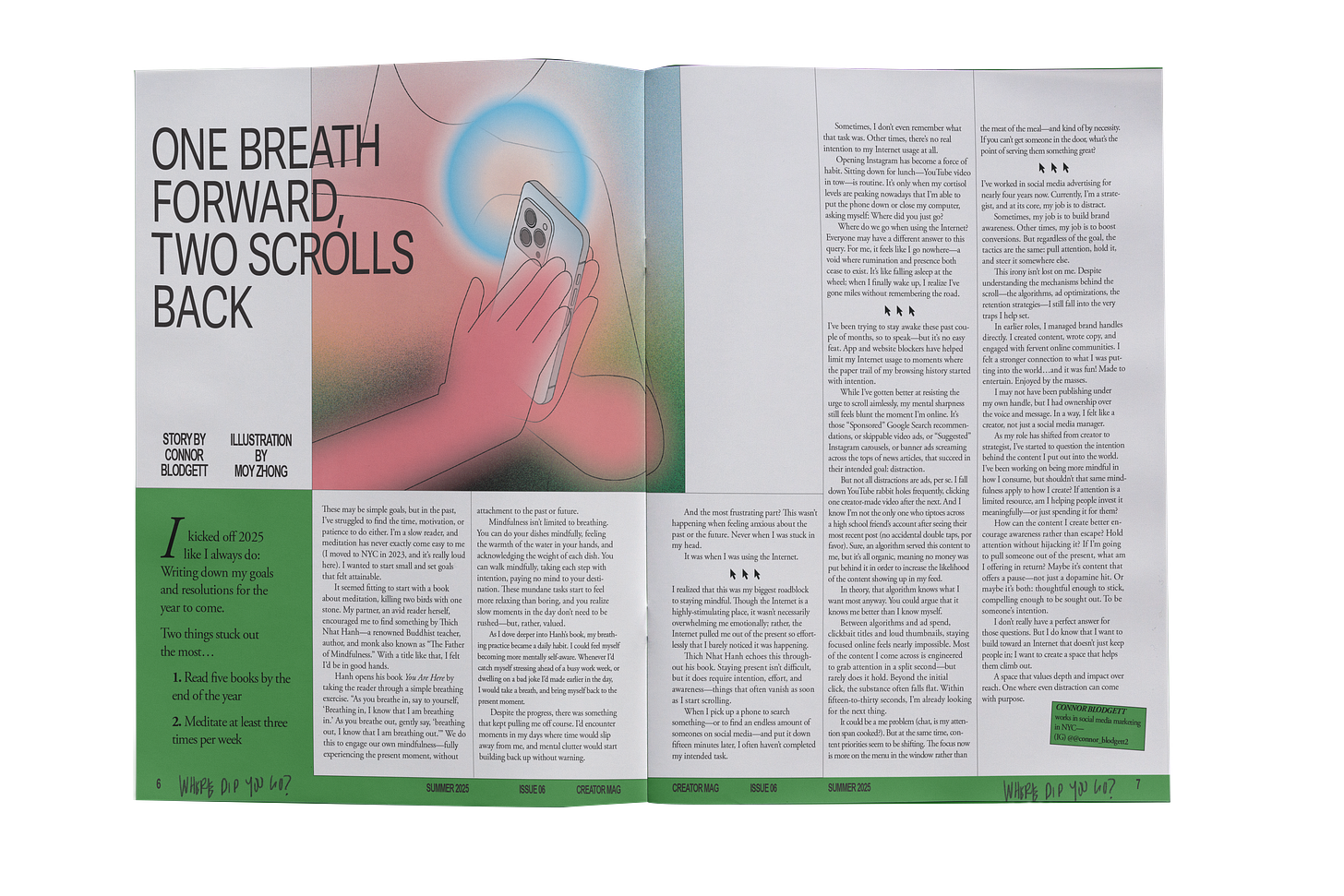
I’ve worked in social media advertising for nearly four years now.
Currently, I’m a strategist, and at its core, my job is to distract.
Sometimes, my job is to build brand awareness. Other times, my job is to boost conversions. But regardless of the goal, the tactics are the same: pull attention, hold it, and steer it somewhere else.
This irony isn’t lost on me. Despite understanding the mechanisms behind the scroll—the algorithms, ad optimizations, the retention strategies—I still fall into the very traps I help set.
In earlier roles, I managed brand handles directly. I created content, wrote copy, and engaged with fervent online communities. I felt a stronger connection to what I was putting into the world…and it was fun! Made to entertain. Enjoyed by the masses.
I may not have been publishing under my own handle, but I had ownership over the voice and message. In a way, I felt like a creator—not just a social media manager.
As my role has shifted from creator to strategist, I’ve started to question the intention behind the content I put out into the world. I’ve been working on being more mindful in how I consume, but shouldn’t that same mindfulness apply to how I create? If attention is a limited resource, am I helping people invest it meaningfully—or just spending it for them?
The questions I ask myself don’t cease there. How can the content I create better encourage awareness rather than escape? Hold attention without hijacking it? If I’m going to pull someone out of the present, what am I offering in return? Maybe it’s content that offers a pause—not just a dopamine hit. Or maybe it’s both: thoughtful enough to stick, compelling enough to be sought out. To be someone’s intention.
I don’t really have a perfect answer for those questions. But I do know that I want to build toward an Internet that doesn’t just keep people in. I want to create a space that helps them climb out.
A space that values depth and impact over reach. One where even distraction can come with purpose.
Connor Blodgett works in social media marketing in NYC.
Thanks for reading! Shoot us a reply, comment, or DM if anything resonated with you—we respond to them all.
* We reserve the right to review referral emails and ensure they’re authentic. Additionally, this flight can be for you…or a friend. Finally, we’ll help pay up to $300 for domestic flights; we unfortunately can’t comp international flights at this time!
** Your ad concept must be approved by our team. We reserve the right to decline any submission that doesn't fit with our magazine's brand, tone, or content.





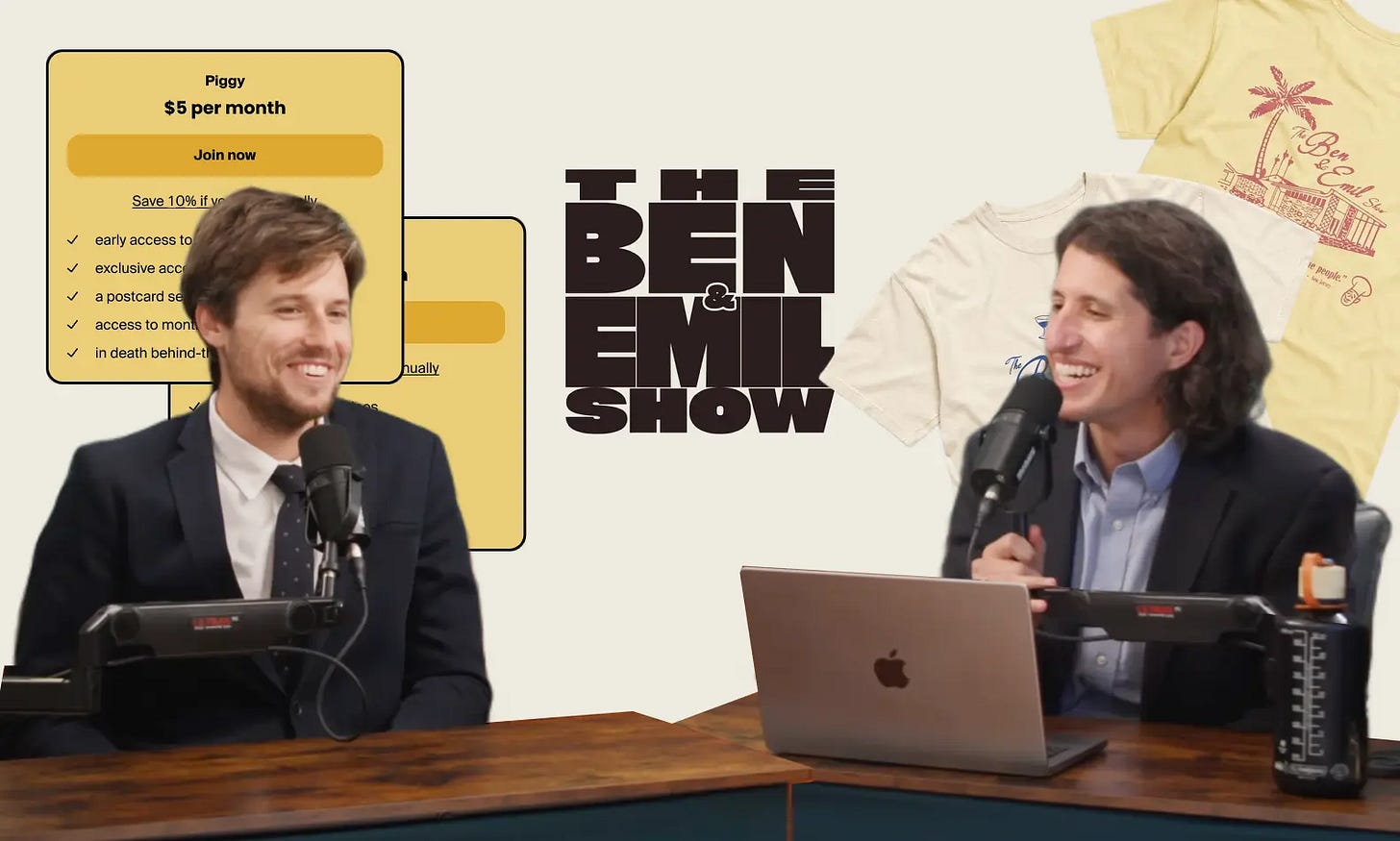


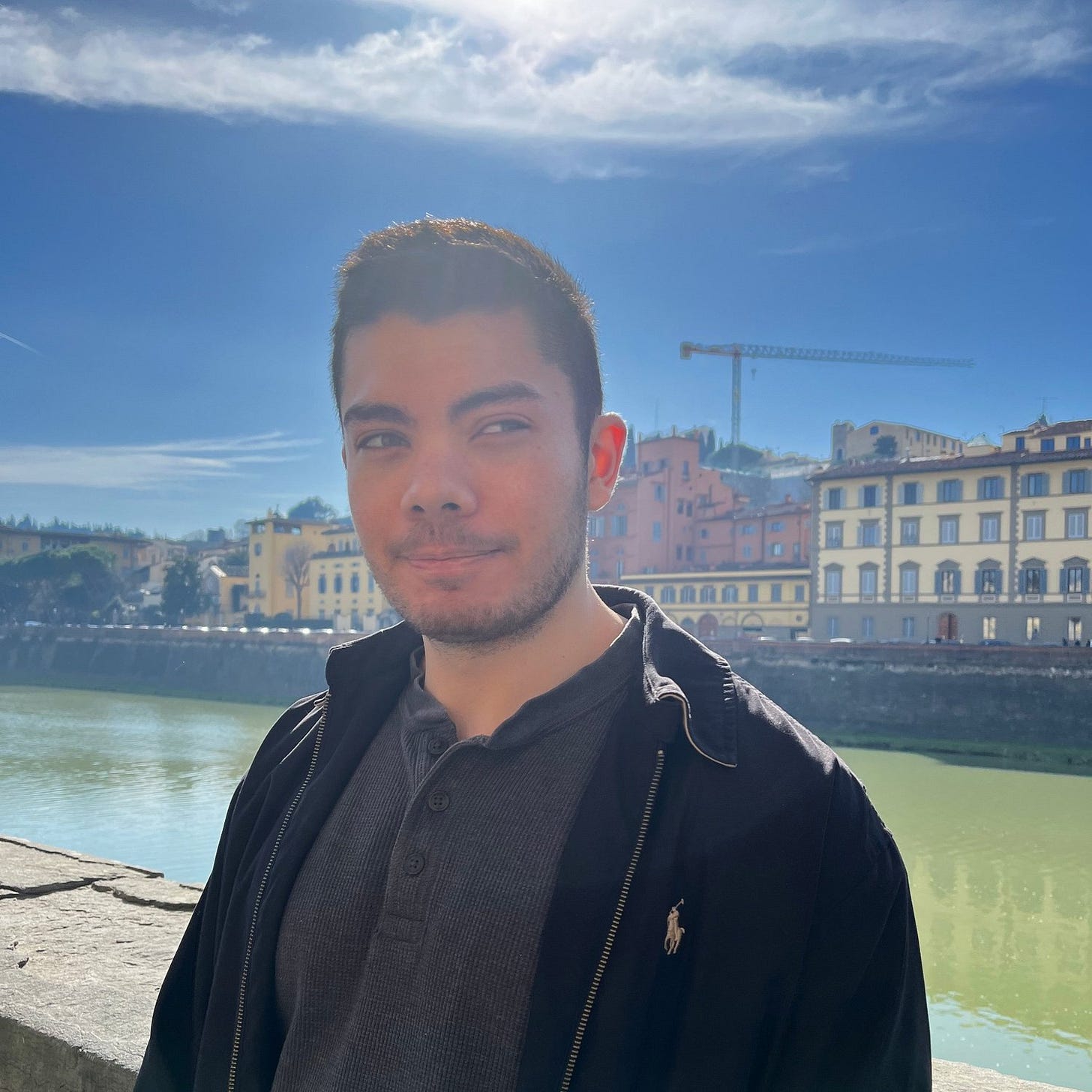
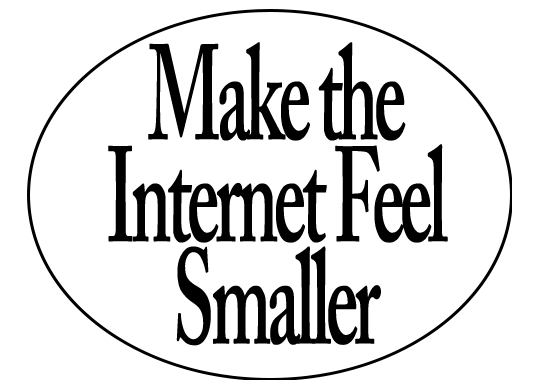

i moved from being a content creator for other companies & brands to being a strategist and really resonated with this! maybe there’ll be a shift in the way we attain, hold, and ask for attention in the future. we can’t be alone in this!